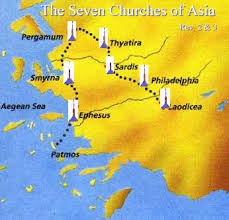
“To the angel of the church in Thyatira write:
These are the words of the Son of God, whose eyes are like blazing fire and whose feet are like burnished bronze. I know your deeds, your love and faith, your service and perseverance, and that you are now doing more than you did at first.
Nevertheless, I have this against you: You tolerate that woman Jezebel, who calls herself a prophet. By her teaching she misleads my servants into sexual immorality and the eating of food sacrificed to idols. I have given her time to repent of her immorality, but she is unwilling. So I will cast her on a bed of suffering, and I will make those who commit adultery with her suffer intensely, unless they repent of her ways. I will strike her children dead. Then all the churches will know that I am he who searches hearts and minds, and I will repay each of you according to your deeds.
Now I say to the rest of you in Thyatira, to you who do not hold to her teaching and have not learned Satan’s so-called deep secrets, ‘I will not impose any other burden on you, except to hold on to what you have until I come.’
To the one who is victorious and does my will to the end, I will give authority over the nations—that one ‘will rule them with an iron scepter and will dash them to pieces like pottery’—just as I have received authority from my Father. I will also give that one the morning star.”
Revelation 2:18-28
As with previous weeks, my job is to acquaint you with Thyatira. Let’s start there. Proper pronunciation. In Hansonese (-B Thigh Uh Tie Ruh. Thyatira,
Θυάτειρα (Gk).
We have spent time with Ephesus, a rich church that had lost a good deal of its fervor. Now we switch to Thyatira, a church much the opposite. It was a very poor church now doing more than it had done at the beginning. With an important asterisk. But let’s learn a little more about the city.
Thyatira was located about twenty-five miles southeast of Pergamos, and is today known as Akhisar, a city of 80,000. The city was founded by Seleueus Nicator, one of the generals of Alexander. It was a garrison city built on the plains, with no natural fortifications, and was captured, destroyed, and rebuilt many times. On coins found in its ruins the city is represented by a horseman bearing a double-bladed battle-ax indicating that it was a cavalry post. The name is said to signify “sweet savor of labor,” or “sacrifice of contrition.” Sir William Ramsay says that the name indicates “weakness made strong” and other writers give the meaning as “never weary of sacrifice”.
Thyatira at the time of this epistle was an important manufacturing city, its citizens being mostly poor and humble laborers, just the opposite of those in Pergamos. They were made contrite by sacrifices, and their lives were made fragrant by the blessings of labor. The workmen of Thyatira were organized into labor unions, or “guilds.” The two leading industries were the manufacture of instruments of brass, bronze, and other metals, and the manufacture and dyeing of cloth, especially of the royal purple. Homer speaks of the dyeing of red and purple cloth as being characteristic of the city. Several inscriptions mentioning dyers and their guilds have been found. Agents traveled far distances selling Thyatiran cloth. Over in Philippi of Macedonia the apostle Paul brought the gospel to “a certain woman named Lydia, a seller of purple, of the city of Thyatira”. It is believed that the local church of Thyatira owed its origin to the labors of Lydia after she returned home. Large quantities of purple and scarlet cloth are still shipped from Thyatira to Smyrna (today known in Turkey as Izmir). It is significant that purple and scarlet are the chief colors worn by the popes and cardinals of the ruling church of the Middle Ages.
I will leave the theology of this passage to others later this week, but as to that asterisk, it is a word that represents the stumbling block not only of the early church, but also for us today, “compromise”. We are to be a people in the world but not of the world. We are just visiting.
Dear friends, I warn you as temporary residents and foreigners to keep away from worldly desires that wage war against your very souls.
I Peter 2:11 [Emphasis added.]
by Bruce Hanson
Note. To access scripture links that don’t appear in the email version, read the differently formatted web version in your browser.

